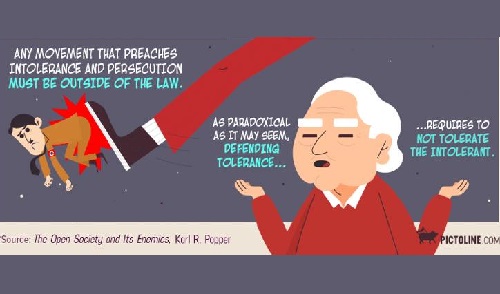Should society tolerate intolerance?
Increasingly, many say no.
A meme making its rounds on social media based on The Open Society and Its Enemies by philosopher Karl R. Popper argues that a tolerant society cannot tolerate intolerance. It features a cartoon image of a giant foot kicking a Nazi in the rear.
Any movement that preaches intolerance and persecution must be outside of the law. As paradoxical as it may seem, defending tolerance requires to not tolerate the intolerant.”
The underlying message seems to be that those who engage in “intolerant speech” should be stopped – with force if necessary. In other words, “we” must crush certain unacceptable points of view. It remains unclear how the powers that be should define “intolerance,” or the particular ideas that society should deem verboten.
Ironically, the left seems most married to this paradoxical narrative of intolerant tolerance. At one time, liberals championed free speech and expression.
No more.
With cultural Marxism driving left-wing progressiveism, stifling “offensive” speech by hook or crook has become the order of the day. Some even deem physical violence an acceptable means of stopping unapproved expression.
Despite the emotional appeals of the thought-police, and their shallow justifications for violent suppression of certain ideas, the case for unbridled free expression remains compelling. In fact, any quest for truth requires it. To limit free expression is to potentially bury the truth and mire society in an endless cycle of banality.
In his seminal work “On Liberty,” John Stuart Mill laid out the liberal case for absolute freedom of speech based on four key points.
We have now recognised the necessity to the mental well-being of mankind (on which all their other well-being depends) of freedom of opinion, and freedom of the expression of opinion, on four distinct grounds; which we will now briefly recapitulate.
“First, if any opinion is compelled to silence, that opinion may, for aught we can certainly know, be true. To deny this is to assume our own infallibility.
“Secondly, though the silenced opinion be an error, it may, and very commonly does, contain a portion of truth; and since the general or prevailing opinion on any subject is rarely or never the whole truth, it is only by the collision of adverse opinions that the remainder of the truth has any chance of being supplied.
“Thirdly, even if the received opinion be not only true, but the whole truth; unless it is suffered to be, and actually is, vigorously and earnestly contested, it will, by most of those who receive it, be held in the manner of a prejudice, with little comprehension or feeling of its rational grounds
“And not only this, but, fourthly, the meaning of the doctrine itself will be in danger of being lost, or enfeebled, and deprived of its vital effect on the character and conduct: the dogma becoming a mere formal profession, inefficacious for good, but cumbering the ground, and preventing the growth of any real and heartfelt conviction from reason or personal experience.”
If we care about truth, society must uphold the absolute right of free expression. Even the most obnoxious, disgusting and vile views illuminate and strengthen the truth. If an individual or group takes action that physically harms a person or their property based on an idea, society should punish the violent act, not the idea.





